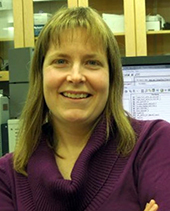Skip to content. | Skip to navigation
Personal tools

- Contact Us |
- Seminars |
- Donate

Lunenfeld-Tanenbaum
Research Institute
Mount Sinai Hospital
Joseph and Wolf Lebovic Health Complex
600 University Avenue
Toronto, Ontario
M5G 1X5
Tel.: 416-586-4800 ext.3018
► Web of Science Researcher ID
K-5101-2012
Dr. Karen Colwill
STAFF SCIENTIST
Dr. Karen Colwill joined Dr. Tony Pawson's laboratory in 2002 to help coordinate large-scale projects and collaborations. Work in the Pawson laboratory is centred on understanding how signals originating from outside the cell are interpreted by components within the cell to generate the appropriate cellular response. This cellular response is dictated in large part by the interaction between proteins that are dynamically organized into vast networks - aberrations within these networks can lead to complex diseases such as cancer.
Specifically, Dr. Colwill is investigating the role and functioning of kinases (enzymes that modify proteins through the addition of a phosphate group), which are critical regulatory nodes within these protein interaction networks. Dr. Colwill is leading a large-scale effort to clone all the human protein kinases and analyze their interaction networks using the latest mass spectrometry technology. Combining this knowledge of physical interaction networks with concurrent phenotypic screens for kinase function will help identify which kinases are critical in relaying specific extracellular signals and may suggest potential therapeutic targets.
The ability to inhibit aberrant protein-protein interactions has great therapeutic potential. Dr. Colwill is coordinating a research program between Dr. Pawson and Dr. Jeff Wrana at the Lunenfeld-Tanenbaum, Dr. Shawn Li at the University of Western Ontario and Dr. Andrei Yudin at the University of Toronto to test the efficacy of using macrocyclic peptides to block protein-protein interactions. Macrocyclic peptides (those that have been cyclized and are no longer linear) have an extended binding surface compared with small molecules. As such, they are more suited to block interactions between modular domains such as SH2, WW and SH3 domains and the cognate binding motifs on their target proteins.
One of the challenges in science is the lack of appropriate reagent tools. To help overcome this challenge, Drs. Colwill and Pawson are working with Dr. Sachdev Sidhu and other scientists to create in vitro synthesized antibodies as probes to investigate protein-protein interaction networks. Having recently generated synthetic antibodies to SH2 domain targets, the focus has now switched to creating antibodies against cell surface receptors, which can function as both laboratory reagents and as potential therapeutics.
To investigate protein interaction networks in a high-throughput manner, it is imperative to have an extensible and flexible system for documenting reagents. Dr. Colwill has led the effort at the Lunenfeld-Tanenbaum to create an open-source reagent information software system to track the properties and locations of all reagents used within the laboratory.
This repository, OpenFreezer, tracks over 150,000 reagents at the Lunenfeld-Tanenbaum. The latest version of the OpenFreezer software is available for free download at http://openfreezer.org/.
At a Glance
Staff scientist in Dr. Tony Pawson's lab.
Investigates the assembly and function
of signalling networks in complex diseases such as cancer.
Also, is coordinating the development of new technologies such as OpenFreezer, and chemical probes for interrogating protein interactions.
Major Research Activities
Currently, Dr. Colwill is managing two multi-institutional research projects funded by the Ontario Research Fund Research Excellence program: Understanding the assembly and function of dynamic signalling networks in complex diseases; and chemical probes for interrogating protein-protein interactions in disease states, both led by Dr. Tony Pawson.



